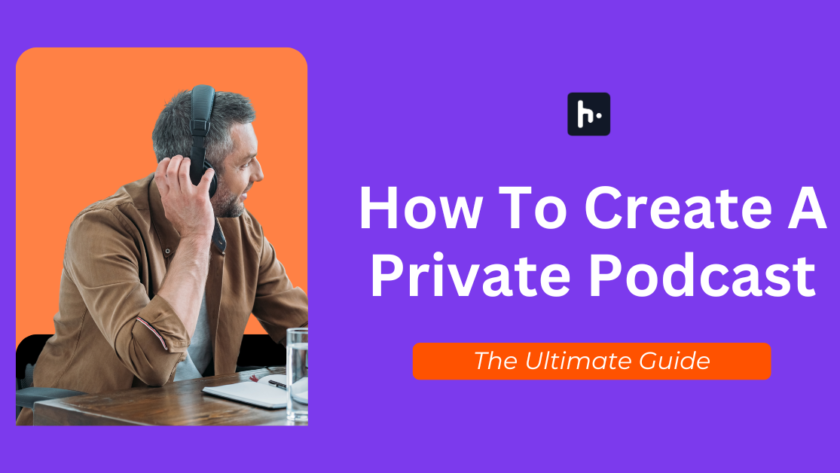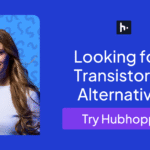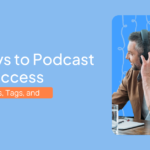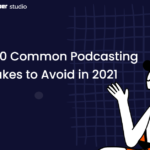Private podcasts are becoming extremely popular due to their nature. Businesses and creators are able to cater to targeted audiences with exclusive content. Almost 80% of podcast listeners complete all or a majority of episodes when they start a podcast. So, private podcasts are creating opportunities for both monetization and community building.
There are many ways of creating private podcasts, the way you choose depends on your requirements. In this blog, we will discuss eight ways of how to create a private podcast.
Without any further ado, let’s dive in.
Table of Contents
What Are Private Podcasts?
Private podcasts are podcasts that can’t be accessed by the public and only a select few have access to it. Public podcasts can be searched and be consumed but that’s because their RSS feed is public, private podcasts have their RSS feeds masked, and are shared personally with subscribers.
What are the Features of a Private Podcast Hosting?
Here are the features of private podcasts that you should know before proceeding to private podcast hosting.
- Limited audience: Private podcasts cannot be accessed by every podcast listener. They can only be discovered by the subscribers of your premium content.
- Distribution control: The Distribution of private podcasts is controlled. Not everyone can access private podcasts. Only listeners with the right RSS feed or membership can do it.
- Confidential content delivery: Content on sensitive topics can be safely delivered. Private podcasts are only available to specific groups.
- Monetization: Private podcasts are typically delivered as premium content. Every podcast or episode is a monetization opportunity for creators.
- Internal communication: Businesses can use private podcasts for internal training. Only your employees can access it remotely. Private podcasts are also preferred for onboarding and internal communication.
- Content exclusivity: Private podcasts are reasonably seen as exclusive content. You can engage your audience better by leveraging the fact that they are consuming content that is not available to the masses.
- Targeted engagement: Private podcasts are shared with specific subscriber groups. So, you can build a stronger connection with your audience.
Why Should You Have Private Podcasts
- Privacy: Since it is not available to the public, the biggest benefit is privacy. Many organizations use private podcasts for internal communication and need this content to be private.
- Community Building: Many creators use private podcasts to provide exclusive content to their most loyal audience and use it for building their community.
- Lead Generation: Many brands and individuals also use it to deliver exclusive content to interested leads to nurture them and provide more targeted content. For example, a coach may prompt their interested leads to sign up for their private podcasts that discuss career burnout. The people who sign up are only interested to hear about a specific topic, aiding the coach to deliver targeted content and increasing their conversion rate.
- Monetization: Podcasters can also put their exclusive content behind a paywall and create a revenue stream via their private podcast.
- Creative Freedom: Private podcasts also give creators the freedom to discuss topics that they don’t want the general public to consume. Limiting the audience gives them the creative freedom that a public podcast restrains.
- Learning Material: Educational institutions may share their exclusive learning material via podcasts to their students and only give access to their students.
How Does a Private Podcast Work?
Public podcasts can be readily accessed by listeners using directories like Apple Podcasts or Spotify. But private podcasts work by limiting the number of listeners who can access the content. Rather than publicly listing podcasts, you share an RSS feed directly with a specific audience. So, you can control who listens to your podcasts.

Here are the aspects that make private podcasts work.
- Secure RSS feed: A secure RSS feed link serves as the address to the private podcast. This feed is not listed in or accessible through public podcast directories.
- Limited audience: The creator limits the audience by choosing who to share the RSS feed link with. For example, organisations can share the feed with staff members. Creators can share it with only paid subscribers.
- Access controls: A direct link or invitation is sent to listeners. This enables access to the RSS feed. The link can be used for subscribing to the private podcasts on a preferred platform. Paywalls or password systems can be used to control access.
- Publicly undiscoverable: Listeners cannot find private podcasts on public podcast directories. Searching for the podcast on public platforms doesn’t work. Only intended audiences can access private podcast content.
How to Create a Private Podcast
Creating a private podcast isn’t all that different from starting a regular one—it just requires a focus on controlled distribution and unique RSS feeds. Here’s how you can get your private podcast up and running:
Choose a Podcast Hosting Company
Many podcast hosting services offer private podcasting solutions. These solutions are great for every type of person or organization who are looking for a straightforward answer for how to create a private podcast. So whether you’re a creator, school, university, or company, if you want to create a private podcast, choose a podcast hosting company. If your current host doesn’t support private podcasts, you might need to switch. Here are some options:-
- Hubhopper – You can start a private podcast with any plan (starting at $12/month, beginning at 100 subscribers), where you can create one, and send invites to your subscribers directly. We don’t even take any revenue share on private podcasts so you can be worry free. Here’s an under 2-minute video guide on how you can create a private podcast on Hubhopper.
- Captivate – you can access the private podcasting feature on all their subscription tiers (starting at $19/month). Members can join through the unique RSS that opens up in their default listening app.
- Transistor – Subscribers can join the feed through a private link or invite. Each time a new episode is published, listeners will receive a notification in-app or through email. You can access the private podcasting feature on all their plans (starting at $19/month)
- Libsyn – It provides a premium paywall and lets listeners stream private content through the Libsyn app or page, taking 50% of earnings.
Set Up a Membership on Your Website
This option is best for podcasters or e-course creators who want to sell a variety of premium content and have been wondering how to create a private podcast. You can distribute and accept payments for private podcast episodes directly through your website. Plugins like MemberPress or WooCommerce help you set up paywalls and automate the payment process.
Try a Third-Party Platform
Third-party podcast apps like Storyboard, uStudio, and Supercast offer secure distribution for your private podcast, with different pricing and features. These platforms are pricier than podcast hosting platforms and one can’t set up payment making them not the best option for creators.
Create a Crowdfunding or Donation Page
This approach works well for established podcasters with demand for bonus content. Platforms like Patreon allow you to offer private episodes and bonus material in exchange for monthly donations. Podfan is another option that lets you provide member-only feeds and accept donations.
Join a Podcast Network
This is suitable for podcasters with a large audience who don’t mind sharing profits. Networks take care of logistics, but they also take a cut of sales. These work best for creators with a large audience (think 50,000+ downloads per month) but may limit creative control.
Leverage Spotify and Apple Podcasts
Podcasters can also use popular platforms like Spotify and Apple Podcasts for private podcast subscriptions. With Spotify you can keep a majority of your earning and give some payment processing fee, while Apple collects an annual fee depending on your country, you can check out the annual fees by clicking here and takes a percentage of the subscription price.
By following these methods, you can effectively create and distribute your private podcast while engaging a dedicated and exclusive audience. Enjoy the journey of building your own private podcast!
What Is a Private RSS Feed, and How do I Create One?
All the magic behind a private podcast lies in the private RSS feeds. To understand it, you must know how a normal RSS feed works. Usually, you’d host your podcast on a hosting platform, get an RSS feed from the service provider & submit it to streaming platforms like Spotify, Apple Podcasts, Google Podcasts, and more.
Your podcast will then be available on all the listening platforms for your listeners to tune into. Anytime you upload a new episode, your RSS feed will reflect the updates across all platforms to which your podcast is distributed to.
A private RSS feed works the same way. The only difference is that it’s not distributed publicly. You’ll have to share these private links with each paying listener so that they can manually subscribe to your podcast.
The good news is that you won’t have to do any heavy lifting. Your hosting platform will create those private RSS feeds for you. When it comes to accessing a private podcast, there are three ways you can go about it:
- Podcasts that are password-protected and can only be accessed through your member website
- A single global RSS feed for all the subscribers
- Unique RSS feeds for each subscriber
Different hosting platforms use different approaches when it comes to creating a private podcast RSS feed, so you might want to pick a hosting platform that provides you with a private RSS feed structure that you like.
With Hubhopper, you generate a unique RSS feed for each subscriber making it easy for you to remove subscribers later.
Where can I Host a Private Podcast?
You can use a private podcast platform for distributing exclusive content to specific listeners. These platforms have features to help you create and distribute podcasts without making them publicly discoverable. Here are some of the best private podcast platforms.
- Hubhopper: It is primarily recognised as a podcast hosting and distribution platform. So, it has diverse features for podcast publishing. The platform supports both public and private podcasts. You will find useful features like RSS feed generation and podcast performance analytics. Most importantly, it supports one-click distribution to multiple directories.
- Buzzsprout: It is mainly popular for hosting podcasts publicly. But the platform also supports private podcast hosting. So, it serves as a central platform for both public and private podcasting.
- Transistor.FM: It supports private podcasting. You can subscribe to a service package that starts at $19 per month. You can use the platform to create episodes. You can make the episodes accessible to your subscribers. You only need to share the RSS feed privately for that.
- Riverside: It is known for helping create and distribute podcasts. It also comes with tools to record and edit podcasts. The platform is designed for hosting both public and private podcasts. It also supports integration with directions like Spotify.
- Spotify for Podcasters: You can publish Spotify private podcasts. It is popular mainly for public podcasts. But you can also host private podcasts on Spotify. The platform is particularly appealing to creators publishing within the Spotify ecosystem. Spotify or Anchor private podcasts are made possible with audience access control features.
How To Listen To Private Podcasts?
You’ve figured out how to create a private podcast, but how do you listen to one? Just like you listen to any other normal podcast, you can also tune into a private podcast the same way. The only difference is that you can’t find private podcasts in a podcast app or a player.
Instead, you’ll receive your unique private RSS feed by the podcaster linked to your email address. This unique URL will give you access to all the private content.
All you have to do is take that unique RSS feed and add it to your favorite podcast app. Once subscribed, you will automatically receive new episodes and can even download them to listen offline.
Which Podcast Apps Support Private Podcasts?
iOS Podcast Apps for Adding Private Feeds:
- Apple Podcasts
- Overcast
- Pocket Casts
- Downcast
- Castro
Android Podcast Apps for Adding Private Feeds:
- Castbox
- Pocket Casts
- Podcast Addict
- Podcast Republic
- Player FM
- Dog Catcher
- Beyond Pod
- Podcasty
- PodKicker
Podcast Apps That Don’t Support Private Podcasts:
- Spotify
- Google Play
- Stitcher
- iHeartRadio
- Acast
- Podcast App
- PodcastOne
- DoublePod
- PodcastHD
- Podcast Guru
Who Uses Private Podcasts?
Private podcasts work exceptionally well when catering to a small audience and need a private setting to share your content. Here is a list of people who use private podcasts and why it comes in handy:
1. Organizations
Many companies are adopting private podcasting as a medium to share training material, weekly updates/announcements & company-wide communications. Not only does it help them in making corporate leadership more accessible but also in sharing information among a large and dispersed workforce.
As many companies are adapting to remote working culture, private podcasts are also great for connecting remote teams and keeping everyone on the same page.
Moreover, it is a great tool for onboarding new employees, cutting down the time the HR team spends on relaying the same information in a format that is enjoyable.
2. Creators
Many creators use private podcasts to share bonus content to their most loyal listeners to make them feel exclusive and also give back to their audience. It prompts the feeling of belongingness and community which further makes them more loyal.
Monetizing their content via private podcasts is also a common way for creators to create a revenue stream for themselves. By offering exclusive content in exchange for a subscription fees can create a stable and scalable revenue stream irrespective of brand deals and sponsorships.
3. E-course Creators
Educational podcasts are a very popular category, and for a good reason. Since audio is a passive and easy to consume content, many busy people listen to podcasts to learn more about things they are interested in. Thus, private podcasts are used by e-course creators to deliver their content and make it more accessible to people.
4. Schools/colleges
As podcasting is being taught in media schools and universities, it’s a good time for them to adopt the medium for e-learning as well. Teachers can upload their lectures or create audio study material and distribute them among the students via a private RSS feed. This could come in handy for not only the current batch but for future ones as well.
Private Podcast Goals
- Monetization: Many podcasters use private podcasts to monetize their audience via exclusive content. If this is your goal, ensure the content is of high quality and worth your listeners’ money.
- Community Engagement: Perhaps your goal is not to monetize but to engage deeper with your community. In that case, you can share behind the scenes, your creative process, bloopers, etc.
- E-learning Enhancement: E-creators may create audio podcasts as a companion to their e-course. It may be an additional resource you want to charge for which can boost your revenue.
- Internal Communication: If your goal is to share company updates, private podcasts are a great tool for a quick and fast dissemination of information.
- Onboarding: Many companies use private podcasts to provide learning material to their new employees to ease their onboarding journey.
- Educational Content: Educational organizations can also use private podcasts to distribute educational material, lectures, course material, etc.
How to Monetize Private Podcasts?
Monetizing private podcasts is easy. Here are the options you have.
- Membership platforms: You can use membership platforms like Patreon to set up a membership system. Your listeners will have to pay a monthly fee for accessing exclusive content like private episodes or bonus materials.
- Early access and exclusive content: You can create premium content that is only shared with paid subscribers. You can also let your paid subscribers access some content early before you make the public. You can also charge your private podcast subscribers for offering an ad-free listening experience.
- Merchandise and sales offerings: You can sell merchandise relevant to your podcasts. It can be any product that resonates with your listener groups. You can also charge admission fees for hosting exclusive webinars or events. Creators of educational videos also charge subscribers a consulting fee.
- Direct support: You can utilise platforms like Buy-Me-a-Coffee to get direct donations for your podcasts. You may also try the Value-4-Value model. Your subscribers will pay based on the value they receive from your podcast.
- Other monetization approaches: You can engage in affiliate marketing. Charge a commission for promoting or selling products through your private podcasts.
Are Private Podcasts a Good Fit for You?
- Companies: If you’re an organization deciding if you need a private podcast, consider the size of your company. Large organizations benefit from a private podcast for streamlined communication. It can also be a great tool for remote companies to give company updates and get every team member on the same page.
- Schools/Universities: Educational institutes don’t change their syllabi often and can record their lectures and send them to the students. This tool can be especially beneficial for students engaged in extracurricular activities who can catch up to their classes via audio lectures. Any institute wide update can also be shared securely and safely via private podcasts.
- E-courses: As an e-course creator catering to busy professionals, you can benefit from private podcasts because your students can listen to your content on the go via their favourite podcast app and therefore benefit from your content despite being busy.
- New Creators: Creators who have an engaged audience can start monetizing their content via private podcasts. If you’re seeing a demand for in-depth content from your audience, private podcasts come to your rescue. But you have to ensure that you have an audience that you can sell your subscription to.
Top 5 Tools for Monetizing Private Podcasts
Now that you know everything about private podcasts, here are five tools that will help you create a private podcast:
- Hubhopper: Hubhopper is an easy to use podcast hosting platform that helps you create public as well as private podcasts. Starting at just $12/month, you can create unlimited private podcasts and share them with your subscribers via email. The best part? There is no revenue share. You take home all the revenue you generate since you decide on the payment gateway.
- Canva: For any design requirements, Canva is a stellar choice. Whether it is to promote your podcast or create episode covers, Canva is easy to use and has a ton of functionality.
- Headliner: Headliner is a great tool to create audiograms and promote your private podcast on social media channels.
- Hootsuite: And then you can use Hootsuite to schedule and manage these social media posts.
- ConvertKit: Hubhopper sends the initial email with the private RSS feed, however for any further email updates, use ConvertKit.
Supporting Premium & Confidential Content Through Private Podcasts
The podcasting space is evolving. Creators have many ways to monetize their content which includes private podcasts. Even companies and education institutions are using podcasts to communicate effectively and securely.
At the end of the day, private podcasts are just a medium. How you leverage it is completely up to you. Before you dive in, understand the needs and interest of your audience to offer valuable content.
Happy podcasting!





